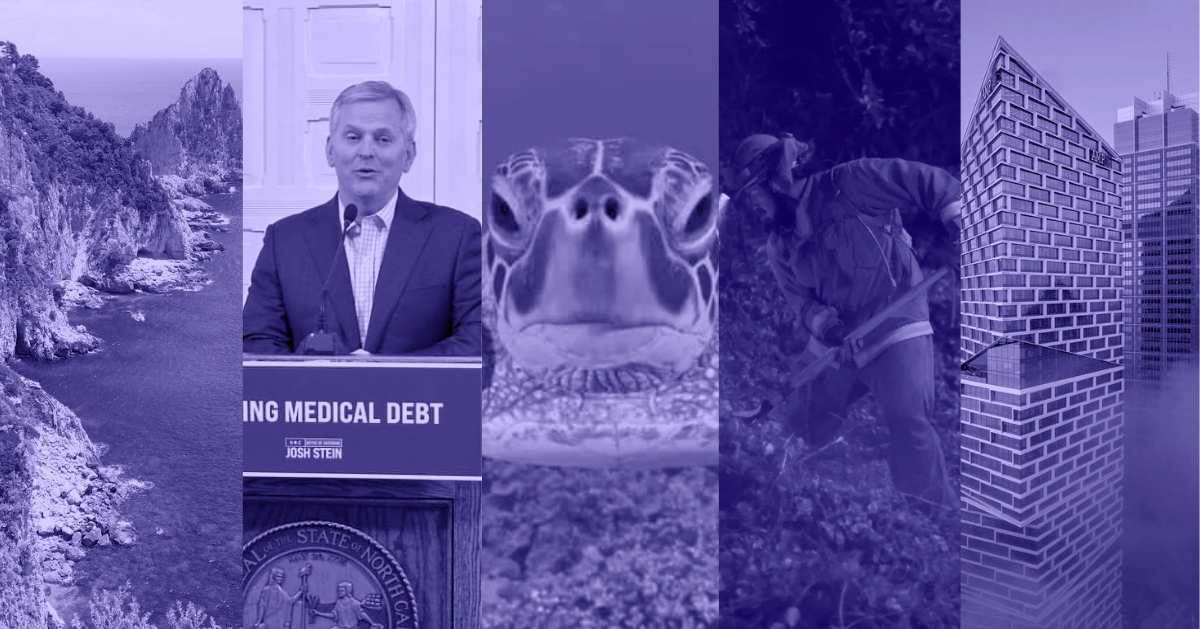Every day the Good Good Good team collects the best good news in the world and shares it with our community. Here are the highlights for this week!
If you want to get good news in your inbox every day, join the Goodnewsletter — the free daily newsletter designed to leave you feeling hopeful.
The Best Positive News We’re Celebrating This Week —
The world’s first ‘upcycled skyscraper’ is a finalist for the coveted Earthshot Prize
When the owners of Sydney, Australia’s AMP Centre wanted to replace the original 1970s structure with a bigger, better, and more energy-efficient building — they also wanted to do it without demolishing the old building.
The “new” building now stands 676 feet tall and retains 95% of the original building’s core as well as 65% of the original building’s structure, including beams and columns. The process saved more than 12,000 tonnes of embodied carbon, the equivalent of 35,000 flights between Sydney and Melbourne.
It was completed in 2022, but was just named one of 15 finalists for Prince William’s fifth annual Earthshot Prize, a coveted competition that celebrates big ideas aimed at tackling climate change.
Why is this good news? While companies may resort to demolition as a “cheaper” option when constructing new buildings, they’re not considering its steep environmental costs. This project “proves that retrofitting buildings that have stood for decades offers a commercially viable and scalable solution to decarbonizing the built environment.”
Jane Fonda and 500 other Hollywood stars are reviving the Committee for the First Amendment. What does that mean?
Good news to celebrate on Indigenous Peoples Day
The first to call these lands home, Indigenous people in America continue to make the country a better, thriving place. Here are just some of their stories to celebrate today:
Through “DeTours,” Hawaii’s Indigenous communities are working to educate settlers and tourists alike on Hawaii and its colonial past and present, and creatively raising awareness about decolonization.
An Indigenous-designed mural is the largest in the world and doubles as a giant solar power generator, reducing 150 tons of CO2 emissions annually.
A South Dakota Y.M.C.A. branch worked with an Indigenous tribe to develop a tiny home project to help address the reservation’s housing shortage. (Gifted link)
An Indigenous, mother-daughter-led nonprofit organization in Los Angeles is addressing challenges that Indigenous communities confront daily with translation services, connecting migrants to translators for border documentation, and more.
Indigenous farmers are reclaiming time-honored agricultural techniques to achieve food sovereignty, or the right to healthy and culturally appropriate meals produced locally using sustainable methods and agricultural practices.
After a decade of work, an Indigenous tribe revived its local beaver population to fight wildfires in California’s southern Sierra Nevada mountains.
Indigenous tribes collaborated with the Montana Department of Transportation to design and build one of the largest networks of wildlife highway crossings in the U.S., reducing animal collisions by 71%.
Last year, the Smithsonian and NOAA rolled out a first-of-its-kind ocean conservation plan in the country, which will prioritize Indigenous knowledge.
→ More good news stories about Indigenous communities
Once endangered due to hunting, green turtles have bounced back thanks to global conservation efforts
In what scientists are calling a major conservation victory, new data shows that green turtle populations, one of the largest species of sea turtles, are bouncing back from the brink of extinction.
The success is thanks to decades of conservation efforts, involving things like protecting eggs, releasing hatchlings on beaches, and reducing accidental capture in fishing nets.
Green turtles were once hunted extensively for turtle soup, its eggs, and decorative shells, and their numbers plummeted, leaving it listed as endangered since the 1980s. They’re one of seven living species of sea turtles, two of which are critically endangered.
Why is this good news? Researchers have long been worried about an extinction crisis, so this is important progress to celebrate, especially as the turtles are threatened by non-human causes like climate change, too. We know that conservation projects are extremely effective — and this is further proof.
Not to mention that protecting and preserving nature and biodiversity saves humanity, too.
→ Read more
Florida’s leatherback sea turtles rebound to record high, following devastating hurricane season
Clean energy jobs grew 3x faster than the rest of the U.S. workforce in 2024, now employing 3.5 million Americans
More than 520,000 jobs were added by the clean energy and clean vehicle sectors over the last five years in the U.S., an increase of 17%, which far exceeds employment gains in fossil fuels, gas, and diesel motor vehicles, and the overall U.S. economy, according to a new report.
More than 3.5 million people in the U.S. now hold jobs related to clean energy, more than are employed as nurses, cashiers, servers, or elementary school teachers.
Experts said clean energy “was one of the hottest and most promising job sectors in the country at the end of 2024,” but warn that continued progress is at risk do to recent changes to U.S. energy policy under the Trump administration.
Through a first-of-its-kind program, North Carolina eliminated $6.5 billion in medical debt for 2.5 million residents
Last year, North Carolina’s state government announced a first-of-its-kind medical debt relief program. Now, the state says it’s eliminated $6.5 billion in debt for over 2.5 million people, nearly one-quarter of its residents.
With an average of $2,600 in debt erased, the impact will be “life-changing” for families.
In the announcement, Governor Josh Stein said, “No one chooses to have a heart attack or get diagnosed with a chronic condition — you just have to deal with it. Today’s announcement will free people from the financial stress so that they can focus on getting healthy.”
Why is this good news? According to Undue Medical Debt (previously RIP Medical Debt), over 100 million people in the U.S. struggle under the weight of medical debt, together owing at least $220 billion in past-due medical expenses. Nobody should crushed by medical debt for an unexpected health event, and North Carolina is seeing that millions of its residents aren’t.
LEGO donates MRI scanner toys to children in hospitals. New research finds they really reduce anxiety
A retired “Tech Fairy” refurbishes old laptops and gives them away for free to people who need them
Craig Clark is from Sarasota, Florida, but he’s also known as the “Tech Fairy.” After retiring from managing a chain of convenience stores, Craig Clark became a computer technician.
His “business” model is a bit unconventional, though: People donate their old computers to Clark, and he fixes them up to pass it along to someone new — completely free.
He’s helped hundreds of people — convenience store workers, fast food workers, college students, servers — who cannot afford a laptop on their own.
California authorized a historic pay increase for inmate firefighters, ensuring they make at least minimum wage
Individuals who are incarcerated in California have been putting their lives in danger to help fight wildfires in the fire-prone state, earning credit toward their sentences and making between $5 and $10 per day.
Now, they’ll make at least $7.25 per hour under a new law that clears the way for inmates serving part of their sentence fighting wildfires, which was just signed by the governor. That wage will also be revisited annually.
More than 1,100 inmate firefighters helped battle the Eaton and Palisades fires in the Los Angeles area earlier this year.
Why is this good news? People deserve to be fairly and adequately compensated for their labor, whether they’re incarcerated or not. Advocates for this change have long said that the contributions and risks incarcerated firefighters take on to help protect communities have not been adequately represented in their compensation.
This cozy game replaces doom-scrolling with ocean exploring, and every creature you spot trains underwater robots in real time
Global investment in renewable energy set a new record this year, even as the U.S. pulls spending
In the first six months of the year, the world invested a total $386 billion in renewable energy projects from small rooftop solar installations to huge offshore wind farms — 10% more than the first half of 2024.
That progress is happening despite the U.S. investing 12% less in the same time period. It was made up largely in the European Union, which invested 27% more in the first half of the year, largely from offshore wind developers shifting from U.S. projects to those in Europe’s North Sea. In the U.K., investment tripled.
Worldwide, offshore wind saw more financial support in the first six months of 2025 than all of last year. Small-scale solar is gaining ground, particularly in China, where investment doubled.
A new, large coral reef containing important species and fossil traces was discovered in the Mediterranean
Using a remotely operated submarine, scientists made a significant and rare discovery in the Gulf of Naples: a vast, white coral reef that contains important species and fossil species.
Discovered at a depth of 500 meters, it was “exceptional” for the region, with never-before observed “bioconstructions of this kind, and of such magnitude,” which are also rarely seen elsewhere in the Mediterranean.
The discovery will help scientists learn more about the role of deep coral habitats, both for conservation and restoration efforts regionally and globally.
Why is this good news? This encouraging news comes alongside the news that scientists believe the planet has reached its first catastrophic climate tipping point: widespread coral die-offs. Coral reefs hold some of the planet’s most robust marine ecosystems, sustaining millions of species of marine life.
The more we can learn about and protect the ones that are still alive and thriving, the better.
Volunteers step up for national parks amid government shutdown: ‘We wanted to be good neighbors’
After his brother died on Halloween, a haunted house owner almost quit — now he’s ‘scaring with a care’
Growing up in Hillview, Kentucky, Cole, Cam, and Cayden Bullock all shared a love for the holidays. Inherited from their grandmother, Cam continued the tradition of decorating their home with massive displays that drew bigger crowds every year.
When Cole was unexpectedly killed in a homicide last year on October 31, Cam was reluctant to continue the festivities. That was until the city reached out to collaborate on a community event that would benefit the USPS’s Operation Santa program.
Cole agreed and concocted Scareview Haunt: a volunteer-run haunted house that’s earned a reputation so terrifying that it’s drawn thousands of horror fans across the state.
More good news of the week —
Great Britain has run on 100% clean power for a record 87 hours in 2025 so far. This is up from just 2.5 hours in 2021 and 64.5 hours in all of 2024, ahead of the government’s clean-power target for 2030, which aims for 95% of the electricity generated in the country in 2030 to come from low-carbon sources.
Backed by Bill Gates, a food startup has raised $33 million to reinvent butter without cows. Savor’s lab-created butter is closer to cow butter than any vegan option on the market, and the company wants to create another option for farmers, chefs, food manufacturers, and customers to help alleviate the agriculture industry’s strain on the environment.
Nabarun Dasgupta was awarded the MacArthur “genius” award for his groundbreaking research on overdose. The fellowship comes with a monetary award of $800,000, and the MacArthur Foundation also noted his work outside the lab, helping develop "harm reduction" programs aimed at reducing drug deaths.
A group of women in Mexico is buying ancient Aztec farms to save a vanishing ecosystem. The women are sustainably cultivating the farms, called chinampas, to preserve the critical ecosystem they hold, which is increasingly threatened by urban development, mass tourism, and water pollution.
A new sunlight-powered film can kill 99.995% of bacteria to provide safe, clean drinking water. The simple, affordable, robust solution to the global safe drinking water crisis was designed particularly for resource-limited and disaster-affected regions.
The Philippines launched a coral larvae cryobank to freeze and store coral for future reef restoration efforts. Bringing together research institutions from the Philippines, Taiwan, Indonesia, Malaysia, and Thailand, the effort seeks to establish the first regional network of coral cryobanks in the Coral Triangle, the global epicenter of marine biodiversity.
Ultrasound technology is being used as a non-invasive, surgery-free advanced cancer treatment. The high-frequency ultrasound pulses create tiny “microbubbles” that expand and then collapse in microseconds, breaking apart the tumour tissue as they do. The patient's immune system is then able to clean up the remains.
Dogs and drones are helping safely and humanely protect the world’s last 74 southern resident killer whales. The orcas live between Washington state and Vancouver Island, and the use of scent-detecting dogs allows humans to give the whales plenty of space to “not stress them out,” while still gathering important data to protect them.
New England’s last coal-fired power plant shut down three years ahead of schedule. Merrimack Station in New Hampshire had only been operating for a few weeks a year, so it no longer made economic sense to keep it open. Now, the owner wants to turn the site into a clean energy complex, including solar panels and battery storage systems.
Researchers are studying how bandages made from living fungi could be the future of wound healing. Fungi are best known for returning dead, organic matter to the Earth, but materials scientists are exploring whether they could someday help our bodies repair, in the form of special hydrogels.
Norway donated profits from its World Cup qualifying match against Israel to Doctors Without Borders in Gaza. The federation’s president said it could not “remain indifferent to the humanitarian suffering and disproportionate attacks” against civilians in Gaza, and wanted to support efforts to provide the urgent medical care people needed.
The founder of The Home Depot donated $50 million to historically Black colleges in Atlanta to support nearly 10,000 students. Billionaire Arthur Blank has committed to giving at least half his wealth away by signing the Giving Pledge, and his family foundation has donated more than $1.5 billion to date.
Nearly every U.S. news organization declined to sign a new Pentagon media policy that “threatens core journalistic protections.” The policy said reporters could have their press passes revoked if they published information that had not been authorized for release by the Pentagon, even if the information is unclassified.
Scientists created a new “superwood” that’s ten times stronger than steel and up to six times lighter. It’s stronger and lighter because the natural porous structure of the wood has been collapsed and toughened, which also makes it impervious to fungi and insects, and it’s received the highest rating in standard fire resistance tests.
An overlooked technology for nearly 50 years, the first liquid air energy storage facility is set to power up in 2026. It's hoping to compete with grid-scale lithium batteries and hydro to store clean power, and reduce the need to fall back on fossil fuels.
Three years after its trial launch, Ireland is making its basic income for artists program permanent. The program, which gives 2,000 selected artists $1,500 per month, began in 2022 to support the arts sector following the pandemic, when artists suffered disproportionate losses due to the cancellation of live events.
Inspired by a walkie-talkie, a new ‘screen-free smartphone’ lets kids communicate safely. As parents seek to decrease digital distractions, and researchers suggest that smartphones are not safe for children under 13, the technology aims to foster healthy growth and independence in young people without all the downsides of smartphones.
An off-grid gold mine in Australia is proving these kinds of facilities can run on 100% wind and solar power. Bellevue Gold regularly operates on more than 90% renewables over 24-hour periods, and on some days, the diesel and gas plants have been completely switched off, with wind and solar — backed by batteries — covering 100% of demand.
After its native population disappeared 100 years ago, flamingoes are nesting in Florida again thanks to habitat restoration efforts. A 1993 federal report found that a hundred years of draining, diking, and rerouting the flows of the Everglades to create urban and agricultural lands made the area uninhabitable for many estuarine animals, but restoration efforts are now showing progress.
Students in Denver are learning about how drought-resistant landscaping can fight urban heat. The lesson is part of a hands-on program, organized by the nonprofit Neighborhood Resilience Corps, that pairs students with professionals who show them jobs that will be increasingly important as the climate gets more extreme.



